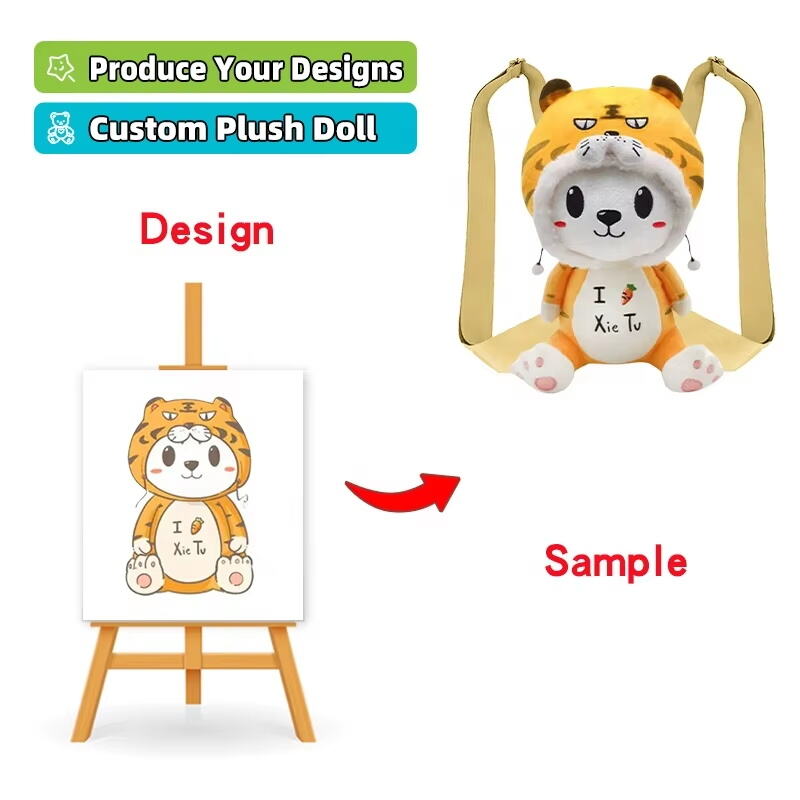Plush backpacks come in a variety of fabrics, each offering unique benefits. You’ll find options like cotton, polyester, and nylon, along with specialty choices such as faux fur or velvet. These different materials influence how soft the backpack feels, how long it lasts, and how easy it is to carry.
Common Materials Used in Plush Backpacks
Cotton
Cotton is a natural material often used in plush backpacks. It feels soft and breathable, making it a great choice for comfort. You’ll notice that cotton backpacks are lightweight and gentle on the skin. This material works well for casual use, especially in warm weather. However, cotton may not resist water or stains effectively, so it requires extra care. If you prioritize softness and eco-friendliness, cotton is worth considering.
Polyester
Polyester is one of the most common materials in plush backpacks. It offers durability and resistance to wear and tear. This synthetic fabric is lightweight and easy to clean, making it ideal for daily use. Polyester also resists water better than cotton, which adds to its practicality. If you need a backpack that balances comfort and toughness, polyester is a reliable option.
Nylon
Nylon is another synthetic material known for its strength. It’s slightly more durable than polyester and resists abrasions well. Nylon backpacks are lightweight and often water-resistant, making them suitable for outdoor activities. While nylon may not feel as soft as cotton, it provides excellent durability and portability.
Blended Fabrics
Blended fabrics combine two or more materials, such as cotton and polyester. These blends aim to offer the best of both worlds. For example, a cotton-polyester blend can provide softness with added durability. Blended fabrics are versatile and adapt to various needs, whether for school, travel, or everyday use.
Specialty Materials (e.g., faux fur, velvet, felt)
Specialty materials like faux fur, velvet, and felt add a unique touch to plush backpacks. Faux fur feels luxurious and soft, while velvet offers a smooth texture. Felt is lightweight and has a distinct appearance. These materials often focus on aesthetics and comfort but may require more maintenance.
How Different Materials Affect Comfort
Softness and Texture
The softness of a plush backpack depends on the material used. Cotton feels naturally soft and gentle against your skin. Faux fur and velvet offer a luxurious texture, making them ideal if you want a cozy feel. Polyester and nylon, while not as soft, still provide a smooth surface. Blended fabrics often balance softness with durability. When choosing a backpack, think about how the material will feel during daily use. A softer texture enhances comfort, especially if you carry the backpack for long periods.
Breathability
Breathability plays a key role in comfort, especially in warm weather. Cotton stands out as one of the most breathable options. It allows air to circulate, keeping the backpack cool against your back. Polyester and nylon, being synthetic, trap more heat. This can make them less comfortable in hot conditions. Blended fabrics may offer moderate breathability, depending on the combination of materials.
Weight and Portability
The weight of a backpack affects how easy it is to carry. Nylon and polyester are lightweight, making them excellent for portability. Cotton backpacks, while soft, can feel heavier when loaded. Specialty materials like faux fur or velvet may add extra weight due to their dense textures. Blended fabrics vary in weight based on the materials used.
How Different Materials Affect Durability
Resistance to Wear and Tear
The durability of a plush backpack depends on how well the material resists wear and tear. Polyester and nylon stand out for their toughness. These synthetic fabrics handle daily use without fraying or ripping. Cotton, while soft, tends to wear down faster, especially under heavy loads. Blended fabrics often combine the strength of synthetics with the comfort of natural fibers, giving you a balanced option. Specialty materials like faux fur or velvet may look appealing, but they are more prone to damage.
Longevity and Maintenance
The lifespan of a plush backpack depends on the material and how you care for it. Nylon and polyester last longer because they resist stretching and shrinking. Cotton backpacks, though comfortable, may lose shape over time. Blended fabrics offer moderate longevity, depending on the mix. Specialty materials require extra care. For example, faux fur needs gentle cleaning to maintain its texture. Regular maintenance, like spot cleaning and proper storage, can extend the life of any backpack.
Water and Stain Resistance
Water and stain resistance vary across different materials. Nylon and polyester repel water effectively, making them ideal for outdoor use. Cotton absorbs moisture, which can lead to stains or odors. Blended fabrics may offer some resistance, depending on the synthetic content. Specialty materials like velvet or felt are more delicate and can stain easily.
The material you choose for a plush backpack determines its comfort and durability. Cotton offers softness and breathability, making it ideal for casual use. Polyester and nylon provide durability and water resistance, perfect for daily or outdoor activities. Specialty fabrics like faux fur or velvet add style but need extra care. Consider your needs carefully when comparing different materials to find the best fit for your lifestyle.


